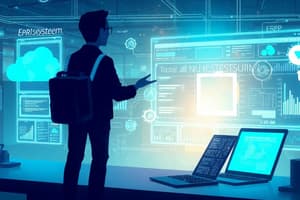Podcast
Questions and Answers
What is the primary purpose of Enterprise Resource Planning (ERP)?
What is the primary purpose of Enterprise Resource Planning (ERP)?
- To oversee financial risk management
- To develop marketing strategies
- To integrate and manage core business processes (correct)
- To manage human resources effectively
Which of the following components does an ERP system typically manage?
Which of the following components does an ERP system typically manage?
- Customer satisfaction surveys
- External market trends
- Employee performance reviews
- Business resources and commitments (correct)
How do ERP systems enhance organizational efficiency?
How do ERP systems enhance organizational efficiency?
- By restricting data access among departments
- By eliminating the need for technology investments
- By facilitating error-free transactions and production (correct)
- By focusing solely on sales and marketing
Which statement best describes the evolution of ERP systems?
Which statement best describes the evolution of ERP systems?
What aspect of ERP systems is emphasized by the integration of a common database?
What aspect of ERP systems is emphasized by the integration of a common database?
What is one of the core objectives of the course on ERP Systems?
What is one of the core objectives of the course on ERP Systems?
In what way do ERP systems differ from traditional system development?
In what way do ERP systems differ from traditional system development?
What has become the largest category of capital expenditure in United States businesses over the past decade?
What has become the largest category of capital expenditure in United States businesses over the past decade?
Flashcards are hidden until you start studying
Study Notes
Enterprise Resource Planning
- Enterprise resource planning (ERP) is the management of essential business processes, often in real-time, using software and technology.
- ERP refers to a suite of integrated applications used to collect, store, manage, and interpret data from various business activities.
- ERP provides a comprehensive and updated view of core business processes through a shared database.
- ERP systems track critical resources such as cash, raw materials, and production capacity, along with business commitments like orders, purchases, and payroll.
- ERP software facilitates information flow between departments like manufacturing, purchasing, sales, and accounting.
- It enables organizations to manage connections with external stakeholders.
- ERP is a multibillion-dollar industry providing components supporting diverse business functions.
- ERP systems have become crucial for both large and small enterprises.
- ERP systems integrate varied organizational systems, fostering error-free transactions and production enhancements.
- ERP system development differs from traditional system development processes.
- ERP systems utilize diverse computer hardware and network configurations with a central database for storing information.
Course Objectives
- The course aims to equip students with a strong understanding of ERP systems and business modeling.
- It promotes the application of information systems within business settings.
- It provides practical experience in decision-making based on data collected from enterprise activities.
- It focuses on aligning company strategy with the implementation of ERP software to achieve business advantage.
Studying That Suits You
Use AI to generate personalized quizzes and flashcards to suit your learning preferences.




